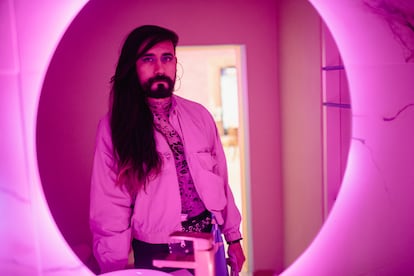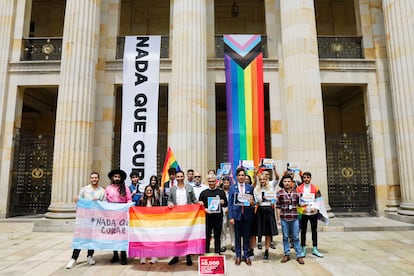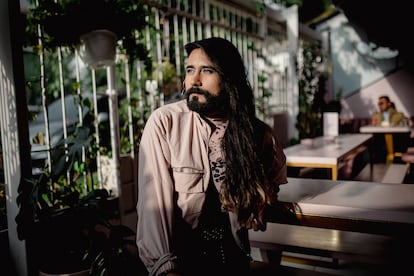‘You’re free from demons and homosexuality’: Healing the wounds of Colombia’s conversion therapies
The Green Alliance party is taking a a bill to Congress that seeks to make these commonly accepted practices a crime

Andrew is 20 years old today. At 12, he underwent conversion therapy to stop being homosexual at the Misión Paz a Las Naciones Church in Cali, an institution to which Colombian presidential candidate John Milton Rodríguez belongs. Despite all the time that has elapsed, he clearly remembers what they did to him: “It was an exorcism to get rid of the demon of homosexuality that I carried inside.”
The liberation ritual, as they called it in the congregation, took place in a rural house on the outskirts of the city. There, half a dozen men grabbed Andrés by the limbs while they squeezed his stomach and repeated the same sentence over and over again: “We release you. You are free from all demons and homosexuality. Renounce the sin that does not let you live to praise God.” “I was trying to move my arms and legs, but I couldn’t. I felt very bad. I was very small, and all the men were older, they were very strong”, recalls Andrés, who says that these rituals were reserved only for drug addicts, alcoholics and homosexuals.
One in five LGBTQ+ people has undergone some type of conversion therapy in Colombia, and among trans people the ratio is one in three, according to a report by the Thomson Reuters foundation. “One of the problems is that most of the people who have suffered this type of torture or abuse do not know that what they are experiencing is actually conversion therapy, because it is not openly promoted and these centers are not dedicated exclusively to these. practices, so these data could be much more alarming”, explains Juan Felipe Rivas, from the NGO Colombia Diversa.
In Colombia, these erroneously named “therapies” — they lack all the certificates from official psychological institutions that would allow them to be considered as such — are legal. This means that, in the eyes of the law, it is not a crime to try to forcibly direct a person’s sexual orientation through dark rituals of a mystical nature, using physical force, threats or ill treatment.

The international organization All Out has launched a campaign that has collected 48,000 signatures to ban these practices. This past Tuesday, the center party Green Alliance, in cooperation with the lawmaker Mauricio Toro, brought a bill to the Colombian Congress that seeks to protect LGBTQ+ people from becoming victims of conversion therapy: “We propose to ban them in Colombia, just as it has been done in France, Canada, Chile and Ecuador, among others. This is a mandate, not only for the 40,000 citizens who signed it, but for the hundreds of diverse people, who should not be afraid because there is nothing to cure.
The bill explicitly prohibits any person from offering, advertising and practicing any of these therapies, as well as seeking profit from them. In addition, it prohibits the allocation of public funds for the practice and promotion of the same. Alberto de Belaunde, spokesman for OutRight International, explains that they found inspiration for the draft in Ecuador and Argentina. The campaign manager for Latin America at All Out, Andrés Forero Ordóñez, said that conversion therapies are a form of torture. “The least that governments should do is prohibit them and punish those who exercise them. They are practices that are based on the completely mistaken idea that these people are sick.”
The vice-president of the Colombian Association of Psychologists, Blanca Ballesteros, explained that suicidal thoughts, depression and anxiety are just some of the many consequences that victims of these procedures can develop.
For Danne Aro, director of the GAAT Foundation (Group of Action and Support for Trans People), one of the biggest barriers when talking about this type of therapy is that the issue is highly standardized. “We tell them as anecdotes between friends, but when you think about it, it is actually very serious because we’re talking about trying to turn someone into something they are not. In my case, I was denied the possibility of having a spiritual bond,” explains Aro, whose parents signed her up to a conversion therapy program when they found out that she was a trans woman.
Now, after a long healing process and hours and hours of informative talks with those closest to him, Aro is already able to talk about it with her family with a certain normality. “Today they recall how they took me there and performed an exorcism on me,” she says.

The experience was particularly traumatic: “I underwent all kinds of tests to find out what was wrong with me. They checked my hormone levels and asked me if I had been raped when I was little. In some religious centers they performed exorcisms and healing processes to eliminate the influence that made me be different or a person with a non-heterosexual sexual orientation.”
When Sergio was 14 years old, the same thing happened to him. His parents took him to a Christian psychologist who asked him if someone had raped him as a child. It was not his case, but it is a recurring question in this type of session. Sergio remembers that the psychologist told him that his parents were willing to commit him if he did not accept the therapy: “You are going to have electroshock therapy. They are going to show you photos of naked men and they are going to give you shocks until your body accepts that this is not normal, that you cannot like them”. As in many other cases, terrified that his parents might have a hard time because of him, he agreed to conversion therapy.
Óscar was not only forced to convert but also became the leader of the Christian community where he was to convert other men like him. “My pastor told me one day that he had had a revelation from God and that he knew I was homosexual. Later I found out that it was other attendees at mass who had told him.” The pastor offered him to go to a place where they did conversion therapy at the age of 15: “I accepted because I allowed myself to be convinced that there was something wrong with me and I was committing a sin.”
He went to a course called Living Waters where in the end they certified him as an ex-gay person. “From there, I myself began to direct that course. I told dozens of men like me that they were sinners.” He made them confess and accept that someone had abused them to justify their homosexuality, to find a justification. “I put myself through conversion therapy, and then I tried to do the same to others.” Óscar became a relentless guide: “I forced them to give up sex and masturbation, and if they had homoerotic dreams, I punished them.” With this, he hoped that they would follow his same path to achieve what they had achieved with him in their day: for guilt to overcome desire.
For his congregation, Oscar’s transformation was never enough. His trust in the community began to crumble when they threatened to kick him out after attending a march in favor of LGBTQ+ rights as part of his work at the Medellin Mayor’s Office. Afterwards, he had to make a list of the people with whom he had had sexual relations to ask for their forgiveness. According to his pastor, this was a restorative practice. But, little by little, Óscar began to distance himself from that man. After five years, he left his community, regretting the damage he had done to himself and to other men.
Tu suscripción se está usando en otro dispositivo
¿Quieres añadir otro usuario a tu suscripción?
Si continúas leyendo en este dispositivo, no se podrá leer en el otro.
FlechaTu suscripción se está usando en otro dispositivo y solo puedes acceder a EL PAÍS desde un dispositivo a la vez.
Si quieres compartir tu cuenta, cambia tu suscripción a la modalidad Premium, así podrás añadir otro usuario. Cada uno accederá con su propia cuenta de email, lo que os permitirá personalizar vuestra experiencia en EL PAÍS.
¿Tienes una suscripción de empresa? Accede aquí para contratar más cuentas.
En el caso de no saber quién está usando tu cuenta, te recomendamos cambiar tu contraseña aquí.
Si decides continuar compartiendo tu cuenta, este mensaje se mostrará en tu dispositivo y en el de la otra persona que está usando tu cuenta de forma indefinida, afectando a tu experiencia de lectura. Puedes consultar aquí los términos y condiciones de la suscripción digital.









































